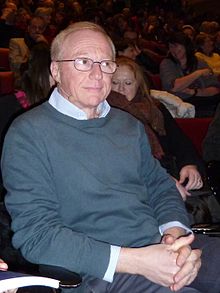The directory «Plots»
Grossman (דויד גרוסמן ) David
(b. 1954)

David Grossman is an Israeli author. His books have been translated into more than 30 languages, and have won numerous prizes.
He is also a noted activist and critic of Israeli policy toward Palestinians. The Yellow Wind, his non-fiction study of the life of Palestinians in the Israeli-occupied West Bank and Gaza Strip met with acclaim abroad but sparked controversy at home. Alongside Amos Oz, he has been one of the most prominent cultural advocates of a two-state solution to the Israeli-Palestinian conflict.
He addressed the Israeli-Palestinian conflict in his latest novel, To the End of the Land. Since that book's publication he has written a children's book, an opera for children and several poems.
David Grossman was born in Jerusalem. He is the elder of two brothers.
His mother, Michaella, was born in Mandate Palestine; his father, Yitzhak, emigrated from Poland with his widowed mother at the age of nine. His mother's family was Zionist and poor, his grandfather having paved roads in the Galilee and supplementing his income by buying and selling rugs. His maternal grandmother was a manicurist. His paternal grandmother left Poland after being harassed by police, never before having left the region where she'd been born. Along with her son and daughter, she traveled to Palestine where she became a cleaner in wealthy neighbourhoods.
Grossman's father was a bus driver, then a librarian, and it was through him that David – "a reading child" – was able to build up an interest in literature, which would later become his career. Grossman recalled, "He gave me many things, but what he mostly gave me was Sholem Aleichem." Aleichem, who was born in Ukraine, is one of the greatest writers in Yiddish, though he is now best known as the man whose stories were the inspiration for Fiddler on the Roof.
In 1971, Grossman began his national service working in military intelligence. Although he was in the army when the Yom Kippur War broke out in 1973, he saw no action.
Grossman studied philosophy and theater at the Hebrew University of Jerusalem. After university, Grossman began working in radio, where he'd once been a child actor, eventually becoming an anchor on Kol Yisrael, Israel's national broadcasting service. In 1988 he was sacked for refusing to bury the news that the Palestinian leadership had declared its own state and conceded Israel's right to exist.
Grossman lives in Mevasseret Zion on the outskirts of Jerusalem. He is married to Michal Grossman, a child psychologist and the mother of his three children, Jonathan, Ruth, and the late Uri.
Grossman is an outspoken peace activist who is politically left wing. Initially supportive of Israel's action during the 2006 Israel-Lebanon conflict on the grounds of self defence, on August 10, 2006, he and fellow authors Amos Oz and A.B. Yehoshua held a press conference at which they strongly urged the government to agree to a ceasefire that would create the basis for a negotiated solution saying: "We had a right to go to war. But things got complicated... I believe that there is more than one course of action available."
Two days later, his 20-year-old son Uri, a staff sergeant in an armoured unit, was killed by an anti-tank missile during an IDF operation in southern Lebanon shortly before the ceasefire. However, Grossman explained that the death of his son did not change his opposition to Israel's policy towards the Palestinians. Although Grossman had carefully avoided writing about politics, in his stories, if not his journalism, the death of his son prompted him to deal with the Israeli-Palestintian conflict in greater detail. This appeared in his latest book To The End of the Land.
Two months after his son's death, Grossman addressed a crowd of 100,000 Israelis who had gathered to mark the anniversary of the assassination of Yitzhak Rabin in 1995. He denounced Ehud Olmert's government for a failure of leadership and he argued that reaching out to the Palestinians was the best hope for progress in the region.
In 2010 Grossman, his wife, and her family attended demonstrations against the spread of Israeli settlements. While attending weekly demonstrations in Sheikh Jarrah [in east Jerusalem] against Jewish settlers taking over houses in Palestinian neighbourhoods he was assaulted by police. About the incident Grossman said, "we were beaten by the police." When asked by a reporter for The Guardian newspaper about how a renowned writer could be beaten he replied, "I don't know if they know me at all."
Israel, 2012, Itamar Walks on Walls